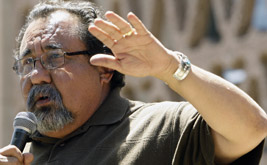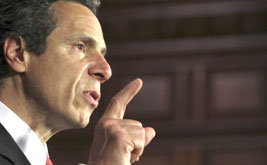The Tea Party in 2011: From Lions to Lambs The Tea Party in 2011: From Lions to Lambs
The Tea Party has had a terrific year, but the payroll tax cut fiasco is weakening their hold on Washington.
Dec 22, 2011 / George Zornick
Thomas Friedman Is On to the Next ‘Bubble Fantasy’ Thomas Friedman Is On to the Next ‘Bubble Fantasy’
That Friedman’s self-serving feints at the truth still earn him a place of high journalistic regard is a sad commentary on the profession.
Dec 22, 2011 / Robert Scheer
Out, Damn Newt: 5 Reasons Why Gingrich Is Headed for Footnote Status Out, Damn Newt: 5 Reasons Why Gingrich Is Headed for Footnote Status
The former Speaker is sliding fast in the polls. There's more to this than just attack ads. He was doomed from the start by his own rancid record.
Dec 22, 2011 / John Nichols
When GOP Walks, Dems Must Move From Blame to Fight When GOP Walks, Dems Must Move From Blame to Fight
Unless there’s a blueprint to break the Republican strategy of hostage taking, the Dems will be left trumpeting their own weakness to avoid blame.
Dec 22, 2011 / Ilyse Hogue
Why Ron Paul Is Not the Tea Party Candidate Why Ron Paul Is Not the Tea Party Candidate
Ron Paul may be the purest fiscal conservative, but Tea Partiers have the same concerns about him that other Republicans do: foreign policy and electability.
Dec 22, 2011 / Ben Adler
Noted. Noted.
Sara Mayeux on Newt Gingrich's attempt to shut down the Ninth Circuit Court of Appeals, Liza Featherstone on the education justice movement and Occupy USA, Jamie Raskin on fosterin...
Dec 22, 2011 / Various Contributors

The Progressive Honor Roll of 2011 The Progressive Honor Roll of 2011
This holiday season, we celebrate the most inspiring activists, organizations and politicians who are fighting for the 99 percent.
Dec 22, 2011 / Feature / John Nichols

Governor Cuomo Is Still Governor One Percent Governor Cuomo Is Still Governor One Percent
Contrary to the spin, New York’s new tax plan privileges millionaires at the expense of the 99 percent.
Dec 21, 2011 / Column / Eric Alterman
Do Americans Hate the Rich? Do Americans Hate the Rich?
Lately, whenever someone notes the chasm between the wealthy and everyone else, and argues for greater income redistribution to level the playing field, a member of the financial elite pipes up to complain about their maligned position in American life. The latest was Jamie Dimon, CEO of JPMorgan Chase & Co., who complained to investors about the unpopularity of bankers “Acting like everyone who’s been successful is bad and because you’re rich you’re bad, I don’t understand it,” the JPMorgan Chase & Co. (JPM) CEO told an audience member who asked about hostility toward bankers. “Sometimes there’s a bad apple, yet we denigrate the whole.” Ignoring, for now, the fact that Dimon’s company received a massive bailout from the federal government—which belies the notion that he’s somehow been successful of his own accord—it’s not hard to understand why people are angry at bankers. Indeed, Joshua Brown, who himself was a banker, does a great job of explaining the dynamic at hand: No, Jamie, it is not that Americans hate successful people or the wealthy. In fact, it is just the opposite. We love the success stories in our midst and it is a distinctly American trait to believe that we can all follow in the footsteps of the elite, even though so few of us ever actually do. So, no, we don’t hate the rich. What we hate are the predators. What we hate are the people who we view as having found their success as a consequence of the damage their activities have done to our country. What we hate are those who take and give nothing back in the form of innovation, convenience, entertainment or scientific progress. We hate those who’ve exploited political relationships and stupidity to rake in even more of the nation’s wealth while simultaneously driving the potential for success further away from the grasp of everyone else. It’s hard to look at the wealth worshiping of American culture and conclude that Americans hate the rich. Rather, Americans hate people who become rich through rent-seeking, and then use their power and influence to pull up the ladder for everyone else. Financial elites crashed the economy, but rather than suffer any adverse consequences for their reckless behavior, they’ve prospered. Worse, they’ve yet to show any contrition for their actions, even as millions of Americans—who had no part in the sideshow—languish in a wounded economy. With that as the background, it’s no wonder that Americans want higher tax rates on the super-wealthy and other redistributive policies—it’s the only recourse they have for a situation that smacks of injustice.
Dec 21, 2011 / Jamelle Bouie
Jon Wiener’s Five Worst Political Books of 2011 Jon Wiener’s Five Worst Political Books of 2011
The Nation's Jon Wiener weighs in with a personal list of the year's worst political books.
Dec 21, 2011 / Photo Essay / The Nation
